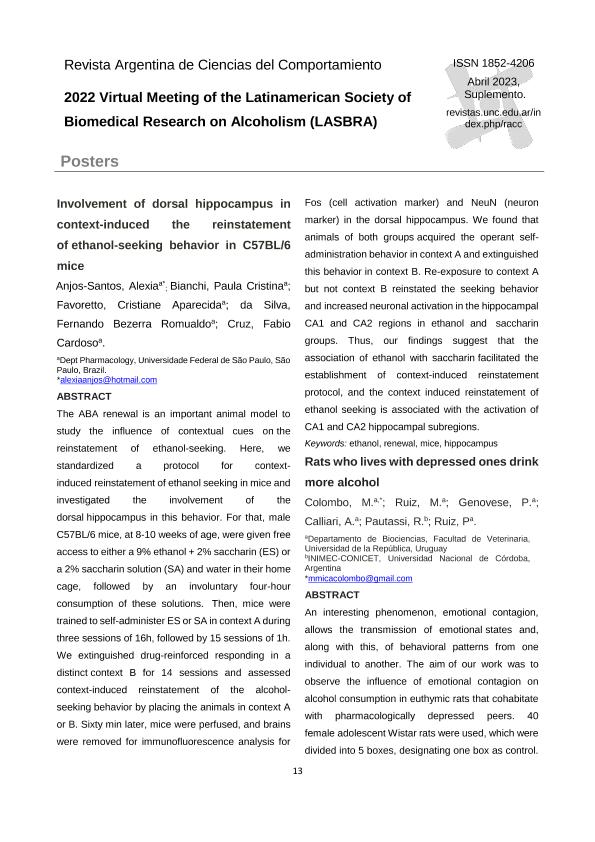Mostrar el registro sencillo del ítem
dc.contributor.author
González Ponce, Bella
dc.contributor.author
Vera, Belén del Valle

dc.contributor.author
Pilatti, Angelina

dc.contributor.author
Pautassi, Ricardo Marcos

dc.contributor.author
Parrado González, Alberto
dc.contributor.author
Dacosta Sánchez, Daniel
dc.contributor.author
Fernández Calderón, Fermín

dc.date.available
2023-09-22T16:43:15Z
dc.date.issued
2023
dc.identifier.citation
Coping motives for drinking as a mediator between anxiety and depression, and alcohol outcomes in community Spanish young adults; II Virtual Meeting of the Latin American Society for Biomedical Research on Alcoholism; Córdoba; Argentina; 2022; 24-25
dc.identifier.issn
1852-4206
dc.identifier.uri
http://hdl.handle.net/11336/212740
dc.description.abstract
Consistent with the medication hypothesis, drinking to cope with negative affect appears to mediate the relationship between mental health and alcohol-related problems, which has been shown in college students. However, there is a lack of evidence in non-university samples that limits the generalization of results. The present study examines the mediating role of coping motives in the relationship between depression and anxiety and alcohol outcomes (frequency and quantity of alcohol use, binge drinking, and alcohol-related consequences). Prospective design with a baseline assessment and a 2-month follow-up. We recruited 334 young adults in the community (mean = 21.1; SD = 2.21) who completed a questionnaire to measure coping motives for drinking and depression and anxiety (Brief Symptom Inventory) at baseline. Eight mediation models were tested, one for each alcohol outcome (at follow-up) for depression and another four for anxiety. The coping motives for drinking mediated the positive relationships between depression and alcohol outcomes, such that higher levels of depression were associated with higher coping motives, which in turn, were associated with higher alcohol-related outcomes. The same results were found for anxiety, except for the relationship between anxiety and binge drinking, which was not mediated by coping motives. Our findings are consistent with the medication hypothesis that "drinking to cope with negative affect" is a critical mediator of associations between mental health and alcohol-related problems in young adults in the community. Training in healthy coping strategies against negative affect should be useful for interventions aimed at reducing alcohol use and their harms.
dc.format
application/pdf
dc.language.iso
eng
dc.publisher
Consejo Nacional de Investigaciones Científicas y Técnicas. Instituto de Investigaciones Psicológicas; Asoiación Argentina de Ciencias del Comportamiento
dc.rights
info:eu-repo/semantics/openAccess
dc.rights.uri
https://creativecommons.org/licenses/by/2.5/ar/
dc.subject
COPING MOTIVES
dc.subject
ALCOHOL
dc.subject
DEPRESSION
dc.subject
ANXIETY
dc.subject
ALCOHOL OUTCOMES
dc.subject
BINGE DRINKING
dc.subject.classification
Otras Psicología

dc.subject.classification
Psicología

dc.subject.classification
CIENCIAS SOCIALES

dc.title
Coping motives for drinking as a mediator between anxiety and depression, and alcohol outcomes in community Spanish young adults
dc.type
info:eu-repo/semantics/publishedVersion
dc.type
info:eu-repo/semantics/conferenceObject
dc.type
info:ar-repo/semantics/documento de conferencia
dc.date.updated
2023-09-15T11:08:25Z
dc.journal.pagination
24-25
dc.journal.pais
Argentina

dc.journal.ciudad
Córdoba
dc.description.fil
Fil: González Ponce, Bella. Universidad de Huelva; España
dc.description.fil
Fil: Vera, Belén del Valle. Universidad Nacional de Córdoba. Instituto de Investigaciones Psicológicas. - Consejo Nacional de Investigaciones Científicas y Técnicas. Centro Científico Tecnológico Conicet - Córdoba. Instituto de Investigaciones Psicológicas; Argentina
dc.description.fil
Fil: Pilatti, Angelina. Universidad Nacional de Córdoba. Instituto de Investigaciones Psicológicas. - Consejo Nacional de Investigaciones Científicas y Técnicas. Centro Científico Tecnológico Conicet - Córdoba. Instituto de Investigaciones Psicológicas; Argentina
dc.description.fil
Fil: Pautassi, Ricardo Marcos. Consejo Nacional de Investigaciones Científicas y Técnicas. Centro Científico Tecnológico Conicet - Córdoba. Instituto de Investigación Médica Mercedes y Martín Ferreyra. Universidad Nacional de Córdoba. Instituto de Investigación Médica Mercedes y Martín Ferreyra; Argentina
dc.description.fil
Fil: Parrado González, Alberto. Universidad de Huelva; España
dc.description.fil
Fil: Dacosta Sánchez, Daniel. Universidad de Huelva. Facultad de Ciencias de la Educación. Departamento de Psicología Clínica, Experimental y Sociale.; España
dc.description.fil
Fil: Fernández Calderón, Fermín. Universidad de Huelva. Facultad de Ciencias de la Educación. Departamento de Psicología Clínica, Experimental y Sociale.; España
dc.relation.alternativeid
info:eu-repo/semantics/altIdentifier/url/https://revistas.unc.edu.ar/index.php/racc/article/view/41065
dc.conicet.rol
Autor

dc.conicet.rol
Autor

dc.conicet.rol
Autor

dc.conicet.rol
Autor

dc.conicet.rol
Autor

dc.conicet.rol
Autor

dc.conicet.rol
Autor

dc.coverage
Internacional
dc.type.subtype
Reunión
dc.description.nombreEvento
II Virtual Meeting of the Latin American Society for Biomedical Research on Alcoholism
dc.date.evento
2022-10-21
dc.description.ciudadEvento
Córdoba
dc.description.paisEvento
Argentina

dc.type.publicacion
Journal
dc.description.institucionOrganizadora
Latin American Society for Biomedical Research on Alcoholism
dc.source.revista
Revista Argentina de Ciencias del Comportamiento
dc.date.eventoHasta
2022-10-23
dc.type
Reunión
Archivos asociados
